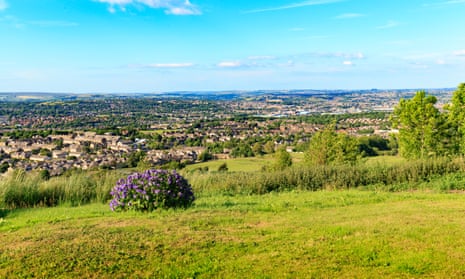From the romantic poets to the global reach of Sir David Attenborough, Britain has a reputation for being a nation of nature lovers.
But the citizens of this supposedly green and pleasant land are ranked bottom of 14 European nations measured for their “nature connectedness”, according to a new study.
Nature connectedness is a psychological concept that measures the closeness of an individual’s relationship with other species and the wild world. Studies have found that people with a high level of nature connectedness enjoy better mental health and are more likely to act in environmentally friendly ways.
The study, published in the journal Ambio, examines which countrywide factors influence the degree of individual closeness to nature, finding the strongest association between biodiversity and nature connectedness, with individuals living in countries where wild species and landscapes are still intact enjoying a closer relationship with nature.
Britain is bottom of the 14 nations for biodiversity, having lost more wildlife than any other G7 country and been shown to be one of the most nature-depleted countries on the planet.
Another country-wide factor in nature connectedness was the average age of a population, with older people tending to enjoy closer relationships with nature – possibly because there was more around when they were children or they had more freedom to enjoy it.
While high levels of urban residents did not necessarily mean a weaker connection with nature, more decisive negative influences on nature connection were higher average incomes and smartphone ownership. Countries with a high level of smartphone ownership were strongly associated with a more distant relationship to nature.
Another study has found that people who take lots of selfies experience less connection with the natural world. The latest study also supports previous research showing that new technology is more significant than urbanisation in the decline of nature words in cultural products since the 1950s.
Prof Miles Richardson of the University of Derby, the lead author, said: “We’re a nation of nature lovers, we cherish our poets, we celebrate our landscape artists and we love our nature documentaries – there is that perception we’re a nation of nature lovers but it hurts to be told that what this data strongly suggests is no, it’s not the case.”
He said it was too simplistic to infer that smartphones were a cause of a loss of connection with nature, but it was part of a spiral of decline in Britain.
“When you’ve lost your biodiversity, you’ve lost your opportunity to engage with it,” he said. “At the same time you’ve got these new opportunities to engage with smartphones or whatever the latest technology is. It’s difficult to make a causal inference but it’s probably a spiral of decline – biodiversity drops, a relationship with nature drops and biodiversity falls further and around you go.”
Analysing data from 14,745 adults across the European countries including Germany, Spain, France and Italy, researchers found British people have the lowest nature connectedness, a ranking of 3.71 out of a possible 7. Italy has the highest nature-connected citizens, with a ranking of 4.67.
Other high-ranking nations are in southern or central Europe, such as Portugal, the Czech Republic and Bulgaria, while north European nations showed the least affinity with the natural world, with Germany, the Netherlands, Finland, Sweden and Ireland making up the bottom five above the UK.
According to Richardson, the measurement of “nature connectedness” could become a useful tool in tackling the biodiversity crisis because the concept does not adopt the dominant western view of humans and nature as separate but captures it as a relationship – as many pre-industrial societies and eastern philosophies have done.
“Although we can’t reduce our relationship with nature down to one number, the world operates with numbers and there are times we need to put figures in front of someone and convince them that something needs to be done,” said Richardson. “It’s one measure for one health – a simple measurement for the health of humans and nature.
“We seek to restore natural habitats but habitat and biodiversity loss is a symptom of a failing relationship with nature, and now people are seeing that relationship as the root cause of a decline in nature. [The concept of nature connection] has got a lot to offer mental health as well. If we’ve got one target to deliver two benefits for people and the rest of the nature that seems a wonderful thing.”
Richardson is calling for the UN to adopt the concept of nature connectedness as a sustainable target, with its 17 sustainable development goals currently either focused on issues for people or for nature. “We rarely focus on the interface, on the relationship,” he said. “Sometimes we’re so disconnected we don’t see the relationship as a tangible thing at all.”
